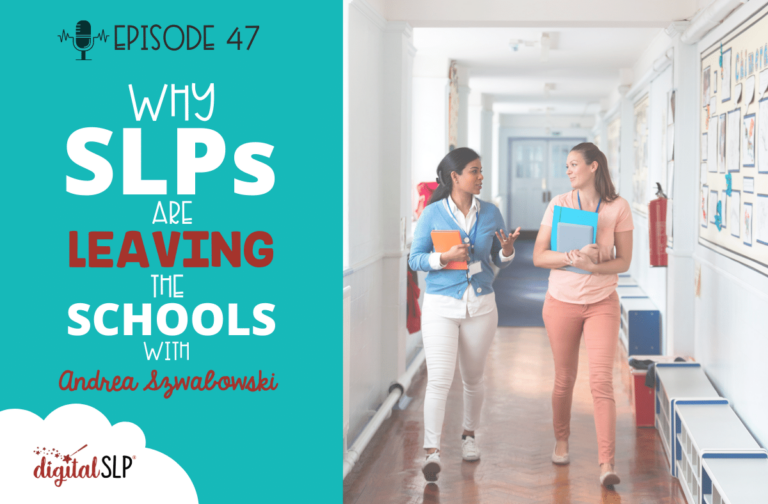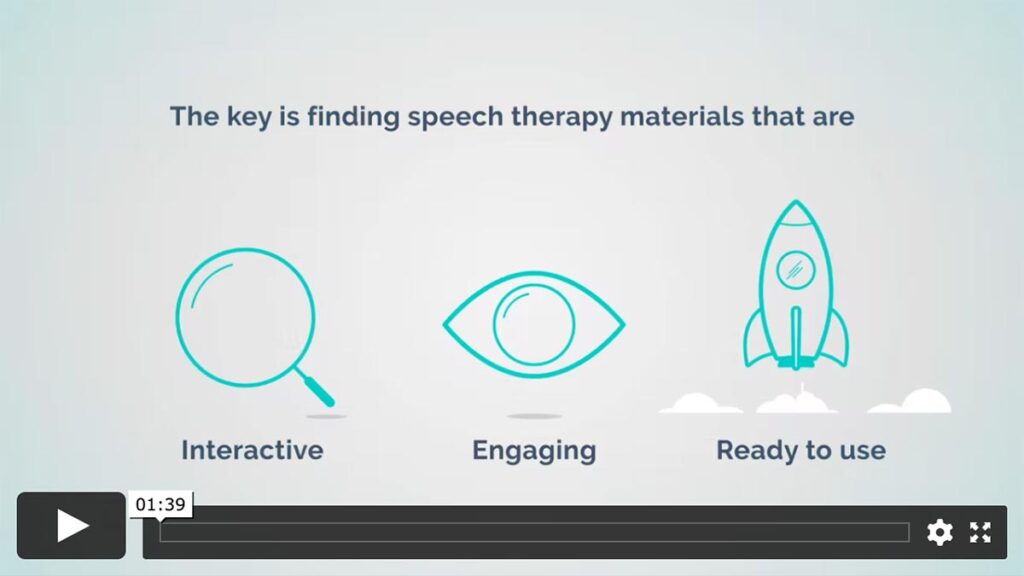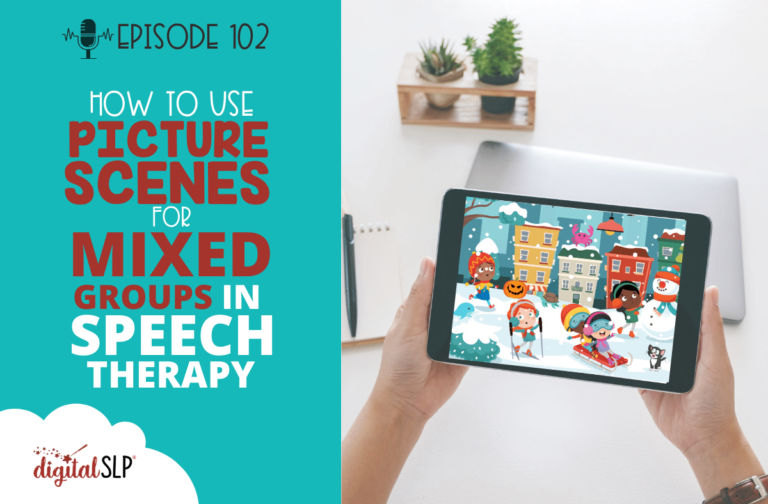In this episode, I had the pleasure of talking to Andee Szwabowski of The Whimsical Word. She brings with her the collective knowledge and experience she has gained over her 20 years of being a public school SLP. Today she shares with us the reason she started her journey in teletherapy in 2016 and what drives her passion for helping other SLP’s.
You’ll want to tune into episode 47 to learn about:
- Tips for SLP’s to avoid burnout
- SLP bullying and what do to if you find yourself in this situation
- How changing your work setting can change your mindset
Links & Resources
The Whimsical Word:
- Website
- Podcast
- TPT Store
- An Open Letter To Why Your SLPs Are Leaving
- Avoiding SLP Burn Out
- Bullying In The Workplace
Full Transcript of Podcast: Why SLPs are Leaving the Schools
Episode 47: Why SLPs are Leaving the Schools
Jessica: You're listening to the Speech Space Podcast, a podcast full of tips and resources for SLPs. I'm your host, Jessica Cassidy, and this is Episode 47. Hey everybody! Thank you for joining me today. Today we're going to be talking about a blog post that was written by Andee Szwabowski. And before I get started, I did want to take a brief moment to let you know that this podcast is brought to you by The Digital SLP membership site, which is a site that features time-saving No print and low prep resources for SLPs. The doors to the membership, unfortunately, just closed up on January the 31st of this year, which is 2019. But If you'd like to gain back some time, use less waste and acquire some great resources, please head on over to thedigitalslp.com/digitalslp. Okay. So before I bring Andee on the show, I did want to tell you a little bit about her. She is the creator and author behind the digital materials over at The Whimsical Word on Teachers Pay Teachers. She's worked for more than 20 years as a public school SLP and jumped into the speech teletherapy world in 2016. Her response to lack of interactive digital materials for the virtual space was to create them herself. This quickly led to the birth of her TPT store, blog, and podcast. Andee has made it her mission to demystify speech telepractice for all SLPs. Currently, Andee serves as one of the new clinical therapy managers at DotCom Therapy, where she uses her experience as a school-based therapist to ensure excellence in service provision. So let's go ahead and bring Andee on the show. Hey Andee, thank you so much for coming on the show today.
Andee: Thanks, Jessica. I'm happy to be here.
Jessica: I'm so happy that we finally were able to make this work. I know we've been kind of... I think Andee and I've been going back and forth since was it the fall? I think?
Andee: I think July.
Jessica: Oh my goodness!
Andee: Last summer?
Jessica: Yeah. So I'm so happy that we finally made this work. Today, we're going to be talking about a blog post that Andee wrote that was all about SLPs leaving the school. I think, I believe it was called "Why SLPs are Leaving the School." Is that right?
Andee: Yes, it was actually titled "Dear Administrator: Why SLPs are Leaving the Schools."
Jessica: Okay, and what inspired you to write that post?
Andee: Well, a lot of things. I spent just about 20 years as a public school SLP... and I've had varying experiences through that. I've worked for several different districts, you know, I've worked with all kinds of students, ranges of students. And, you know, as I went through my career, there were times where I simply felt you know, overworked, overburdened, wondering exactly what it was about the setting. The longer I stayed in it, why it was becoming more difficult, why was having less resources, why my caseload was always super high, why it was difficult to get kids qualified or get what they needed. And then, you know, I felt like the longer I stayed in public education, almost kind of like the worst things got. And you know, you think about that with age. Well, maybe it's just my age and maybe I've just done this too long. And so now, you know, these things are just, I'm learning more and so I'm internalizing it more. So I had a chance in 2016 to jump into telepractice and, as a result of that, I was amazed at the difference and how I was feeling about my job. I was like, I can service kids one-on-one and they're making progress. And I dictate what materials I used. And I dictate when we have the meetings. And I get to be the one who kind of calls the shots. And kind of run this the way I think the kids deserve to have the service. And so in the process of that, I kind of started to blog about my experience. And as soon as I started to blog, I had this giant influx of people who were contacting me on social media and they were saying, oh my gosh, I want to learn more about telepractice. Can you tell me more? And so in the beginning, and I can't do this now, but in the beginning, I actually would offer to either call people on the phone to tell them a little bit about telepractice. And I'll tell you my rationale for that reason being, I felt like at some point, if somebody would have said to me, 15 years ago or 10 years ago that this was an option for me, I absolutely would have done it being a new mom. You know, I really thought my options were schools, hospitals, early intervention, skilled nursing facility. Like, I didn't know there were any other options. So I guess that was really my rationale for reaching out to people and being like, I don't know, I'd been a speech therapist for 20 years. I didn't even know that, you know, how new is this? I didn't even realize it was an option. So that was my rationale for talking to people. But what happened in the process was I collected more and more and more stories of people who were either just like me or what was even more alarming to me were people who were only five years out of the field who were calling me in tears. I had girls in tears. I can't even tell you the amount of long emails that I received from girls who were like, I can't take this, I'm having panic attacks at work. I have someone that maybe is, you know, an administrator who's not nice to me. My caseload is 120 students. You know, can I jump into telepractice? And each story, each story, each story that I heard was almost validating to myself. And some of the stories actually kept me up at night and I put that in the blog post. And so these were things that, you know, ideas that have been swirling around my head for many, many years. And I've got this confirmation from all of these people and I'm like, I just have to sit down and write this. I don't know what's going to happen, as a result, but I'm just going to write it. So the post exactly is simply I wrote the letter as if I was a speech therapist, kind of writing a resignation letter, and all of the things that I wish I had the courage at that time to almost tell the administrator about how I'm feeling based on the collection of stories that I received and my own feelings. And what happened as a result of that was this viral sort of an experience. And really, it was only one of my first, I think, five blog posts that I wrote that I did not anticipate. And I really, at some point, was kind of virtually covering my eyes, thinking people are really going to be angry about this, and I'm just going to have to take the hit. But to be honest with you, the result has been maybe 2% negative and 98% positive. And I continued to get responses on that post about, you said you put exactly what I was feeling into words and thank you for validating me. And at the end of the letter, I actually say, you know, to an administrator while I appreciate this opportunity, I'm going off to kind of find a new adventure. And I don't know what that adventure necessarily is. For me, it was telepractice. But people are saying the post inspired me to actually think creatively outside of the box about where else I can take my career. And so in a way that's a positive thing because people are starting to think, well, I guess I really don't have to take this if I'm not happy. And really that, that really is the message. So that, that's what kind of inspired me. It's kind of led down a rabbit hole of other feelings for people, but it really that's really what inspired me to write it.
Jessica: Yeah, that's great. I didn't realize that it was kind of like a collection of stories behind it. I think that's amazing that you kind of gave voices to all of those SLPs that you talked to over the years.
Andee: Yeah, it really was. And you know, I had been, throughout my career I had been in these giant cohorts. I've always been lucky that I never was alone on an island, except for maybe when I did early intervention. I always was lucky enough to work with 4 or 5, 6, 7, 8, 9 speech therapists. And one of the last places I was at in a brick and mortar setting, we got together often and try to discuss, you know, how can we get together to kind of, you know, inspire some waves of change and how can we help meet the kids' needs and how can we get our resources? Like what extra things can we do? And no matter what idea we came up with, it was always met with resistance. It was be a warm body, service the students, take the $5 we give you, and try to magically turn it into $25 to meet your students' needs, and don't ask questions. And it was very, even though we were collectively groups of people who really wanted to inspire change, nobody would listen. And I think that was really the heartening, the disheartening part about it. And then, you know, we watched some of our colleagues who I do mentioned in the post, you know, and I don't mean to offend any psychologists or social worker, but my experience has always been, the psychologist gets the new office with the shiny test protocols and I'm still, you know, working with a PPVT2. And I don't, you know, that's been outdated and no one will buy me a new test. And as I'm talking to people, these are the same experiences, you know, and then the social workers' like, oh wow, now I have 40 students. Oh, you know, we're going to get you an intern to help you out. I'm like 40 students, I've got 65! These poor girls in Indiana have 120! You know, and I'm thinking, this is everyone's experience that somehow there are other disciplines that are very related to us that seem to almost, I don't know if it's all the time, but, you know, instead of it being more of a collaborative, we're all kind of on the same level, the administrators are putting them and their needs sort of before ours. Not that, you know, every psych and every social worker I've ever worked with has been absolutely collaborative and wonderful. It was really more from a top-down perspective that they needed so they got, and we were just a squeaky wheel. We were just a squeaky wheel complaining. So again, it was really a collection of stories from people that just resonated with my own. And what strucked me again is that it, wasn't just people in my age bracket who, you know, let's be honest, there are some people that are bitter or they've had really bad experiences. And it was really girls that were two years out of school, three years out of school. It really didn't matter, to be honest with you, what their age was or how long they had spent in a school-based setting. It really age really had very little to do with it.
Jessica: Right. Yeah. And it's funny that you brought up the psychologist piece because I actually, I mean the article, and I'll make sure I link to this in the show notes, it's so well-written but I actually had copied, and so I could quote you, it says the psychologist who only visits the building twice a week on odd days gets a window. And I was like, wow, like, I mean, a lot of that will resonate with a lot of people, for sure.
Andee: Right. I begged for window. I literally, every job I ever got, I was like, can I please have a window? I have seasonal affective disorder so for me to have a window would be amazing. So when I started telepractice, we, at the same time we bought a new home and I literally, as I walked through every home that we thought of buying, I was like, where am I putting my office? I literally... my window, I'm in, I actually am lucky enough to have a walkout basement, but we have nine giant windows in our walkout basement. And I am like, I just sit by the sun every single day and I have never been more happy.
Jessica: That's great. That's great. That's funny that you say that too, because I was just mentioning that my office is in the basement and I do have a window, but there's like bushes out in front of it. So I, today am upstairs recording in my daughter's room that has a nice right window because that, you know, I'm the same way I need my sunlight.
Andee: It makes us happy. And you know, those are things that, you know, those little things. And if at the end of the post, I actually give advice to administrator. You know, the next time that you get a speech therapist, I hope she's kind of treated a little bit better than, than I would be in. Here's my advice to you, you know, and you can read part of that if you'd like to but or for anyone who wants to read it, you know, I kind of give advice about, you know, if you're an administrator, these are things, these are little things that make us happy. You know, we really aren't asking for the world, we're really just asking for a handful of really easy things that would make us happy. You know, I don't think we're, you know, I've often heard it said before that, you know, speech therapists are just real high maintenance and I don't really consider us to be high maintenance. I really feel like we're just, we are a profession that have these giant hearts and we want to be able to do it all. And we want to be able to be, we want people also to know our worth. We've gone to school for a really long time. These new girls have mountains of debt and we just, we just want to be, we want our worst to be no.
Jessica: Yeah, definitely. Definitely, and it's so frustrating. I mean, like you said, you were kind of joining together with other SLPs and you still weren't being heard. And I think it's one thing if you're being heard and there's maybe some empathy and saying, you know, our hands are tied, there's certain things we can't do, but just to kind of be ignored when you're trying to be so proactive. I mean, that's a whole different level of frustrating, you know.
Andee: Well, and even the fact that we were coming up with easy, cheap solutions to our own problems, you know. We didn't just lay the problems at our desk and say, you need to fix all this. We literally developed a... in my case, we actually had a presentation of things that we would like to see. How we could retain people and just the small things that you could do to make this job better. And it just kind of fell on deaf ears. And again, this isn't, I didn't necessarily write the post based on my own experience. What happened was I talked to girls of all ages, you know, experience levels and they resonated my same story. So I was like, well, here, I'm not alone.
Jessica: Right.
Andee: That's really the interesting part about it.
Jessica: Yeah. And what were some of the other things I know we touched on not having money for resources, not having a proper office, possibly caseload size. Oh, I know one thing that I wanted to bring up was speech teacher, being called speech teacher. What are your thoughts on that? I know there's a little bit of a divide. You know, some people they kind of welcome it and then other people are like, don't even.
Andee: You know, I'll be honest with you. My own personal opinion is that was something that never bothered me, but I know it's something that bothers a lot of people. And so that was something I had to bring up in the post because, you know, oh, the speech teacher. You know, is she a social teacher? Is she a psych teacher? You know, that was the other thing about it is that, you know, when I look at, I know why people feel that way, the level of education that we have puts us in such a dynamic place, in such a place that is so much different than our colleagues. And so I think that's why that actually bothers people, you know, and I should talk about that in the blog post about, you know, we have been, our skills are so much different than a I quote teacher. Again, it doesn't personally bother me. You know, and especially too, when I'd work with families. Families don't know pathologist, they know speech teacher. And so I never, you know, the years I did early intervention, the years that I see kids privately, they'll say, oh, your speech teacher, that really doesn't bother me, but I do know for people, it's a pain point for sure.
Jessica: Yeah, definitely. Now I know you wrote another article about bullying in the SLP workplace. Do you want to talk about that for a minute?
Andee: Sure. It's, it's something that's a little bit difficult to talk about, but that was another post where I woke up one day and I was like, today's the day. I have to, I have to, for lack of a better word, I have to vomit this onto paper. That's kind of, I had these creative waves and that's kind of one of the things that happens to me when it comes to writing. I just had this urge to put it on paper and I actually wrote it with the intention of never publishing it. But then once I wrote it, I was like, is there somebody that could benefit from my experience? And I'm a very religious, faithful person. And I really felt like God was telling me somebody will benefit from this. So it needs to get on paper. So my experience was, and I didn't really go into the details specifically in the blog post, but essentially I was in a situation where, you know, special education as a whole is just changing. You know, there's so much, you know, public education, there's a lack of resources. And school districts are sometimes forced to make decisions maybe they wouldn't otherwise make had they had funds or resources. And so I was put in a situation where over and over and over again, I was seeing special education be last in line and students not getting what they needed to get. And, you know, I tried to go about it the right way, you know, what can we do? I'm a problem solver. That's what I do. And I love to lead and I love to teach. And so, you know, trying to go down the right avenues of "this isn't right, what can we creatively do to fix these problems?" And it really, in this situation I was in, it was very much of like an, like an oligarchy, you know. One person makes the decisions and we don't want to hear from the masses. And we don't, we don't really want to collaborate with you. It was a traditional boss, you know, authority figure sort of a situation. And so unfortunately in their mind, I had sort of crossed a line where I had spoken out at a board meeting and I had asked the board for what we needed as a staff member, you know, in a very professional way. This is what we see collectively. And I spoke for a group of people. It wasn't just myself. This is what we see as a special education department. This is what we would really need to make us feel really good about coming to work every day. And so we're asking you to consider those things. Well, unfortunately, the director of special ed was very, she felt very offended and very hurt that I spoke up. I will also preface this by saying, this is something that I think my readers should know. In this situation, I worked in, lived in the same community. So I worked at my children's elementary school. So I was seeing, I was, you know, privy to seeing my students who were also my neighbors, who were also the same kids that played softball with my daughter or danced with my other daughter. And I knowing in the back of my mind that they're not getting what they need. So that puts me in a unique perspective because I care about my community and I care about my neighbor. And I care about the little girl that my daughter dances with. And I care about the girl who's trying to learn softball with my other daughter. And I care about these families. These are people that sometimes I hung out with at the pool, in the park. And so it wasn't simply just a job for me. I was completely immersed in this community. So not only did I speak up at the board meeting as a staff member but I spoke up as a community member as well. It did not go well, it was not received well, despite the professionalism that I had. And I essentially made the wrong people mad and so very quickly the job that I knew and loved changed immediately. I began to be physically intimidated in my office by principals. I was often cornered when other people weren't around and things were said to me. I then was transferred from my children's school, probably as a retaliatory, they knew that junior high wasn't my thing. And I was very open about that. I really love littles. And so what did they do? They transferred me to the junior high with no reason whatsoever. And so I tried to fight that I got more pushback. Then all of a sudden I was being written up for things that I didn't do. They were lying about things that they said that I did. And when I would try to essentially defend myself or come back with proof, they were like, well, we don't need proof. I'm like, yes, you do. You're... and unfortunately, in a small town, you know, the union as good as they tried to be, you know, the union president is best friends with the administrators and the, you know, this is a really small town, so everybody knows everybody's kids. They've lived together for generations. It's a farming community. So I didn't really get any help. And it became so significant that every day something was happening. I was afraid to go to work and I started to have panic. And I started to have like this depression and each day I got another blow from something else. I was accused of something. I was physically intimidated. I was told over and over again that I wasn't good enough. I was lucky enough that one of the board members happened to be a good friend of mine. And she was informing me of the lies that the administrators were telling about me in closed session, which made me even more anxious. The teachers and the community rallied against, rallied against the board. The board received over 20 letters from parents who loved me, wanted to keep me didn't know why I was being transferred. Many of them actually spoke out and it didn't matter. It was, we're moving her. And the more I resisted, the worse the trauma became. So in the end, my husband had had enough and he, I lived in Illinois. He called down to the headquarters of the union in Springfield, Illinois. And he said, my wife needs somebody to help her. And so the union representative from like the main headquarters here in our area came up and she helped me. And we had meetings and meetings and meetings, and she fought on my behalf. And at one point she literally turned to me and she said, I'm going to tell you something. They hate you.
Jessica: Wow.
Andee: They will go to any lengths to bring you down. Are you hearing me? You cannot stay here. You.. I'm afraid of what can happen to your children. I am afraid of what can happen to you as a career. They will go to any lengths to ruin you. You take your name off the door, you take your good name, you take it with you and you go. And when I heard that, I was like, I can't ignore that as much as I want to stay here. And as much as I want to fight for the kids, and as much as I want to fight for my job, and I don't want to give into what they're doing to me, I also realized that I am going to land myself in a mental hospital if I stay. So the experience was extremely traumatic and I left. I was lucky enough to land in a wonderful school district. And I made amazing friends and they helped kind of build me back up. I still have a lot of like PTSD sort of symptoms. I still struggle like my one, even though we moved. So, and then a year later we moved completely. So we moved out of the town. We moved two hours away. I started telepractice, but I still have weird things if I even totally different person, totally different district. If I get an email, let's say from my daughter's principal, I literally can feel my neck begin to get hot. And I begin to feel panic or like she has an event at school. I find it really hard to walk even into a physical school building. It's been that traumatic for me. So I wrote the blog post because I felt like it was just, I had to just, I kept it really hidden for a long time. And I had a lot of shame over it because I still thought I did this to myself. I'm bad. I'm wrong. All the things they said about me are true. That I'm worthless. I'm not a good speech therapist. Nobody likes me. And that I internalized all of that. So I still have some of that at some level, but I've learned to... I'm almost there. I feel like I've almost regained some of that at this point, but it's still, it's very traumatic. I can't even really go into like a school building without feeling some anxiety. So it's really traumatic. So I wrote the blog post and the response was, I can't believe this has happened to me. I can't believe this has happened to me. And so I just keep getting letter after letter, after letter, after email, after email, and every time somebody reposted the posts, I get at least three direct messages of I read your story. And this happened to me. And actually at one point, this was back in November. I got this very long email from a follower who detailed her experience and how my experience resonated with her and how my post really helped her. And I, it was, I literally did this giant flip Facebook Live cause I was like, I have to address this. I want people to know that I'm hearing you. I don't know the answer to this, except for if you feel like you're being violated in any way, get out. No one should have to live like that. But again, I go back to the deeper issue. What is systemic that this is happening? I mean, this isn't, this isn't just education. This is healthcare. This is, you know, law enforcement. This is, this is not unique. This is... we are not a unique culture. Education as itself is not the only field. We are not the only field that this is that this is happening. So this person who wrote me happened to be a speech therapist. So it resonated with her and I did a Facebook Live and it literally has been my Facebook Live that has gotten the most attention because people keep watching it. I was like, I hear that this is affecting you. And if I could give you any advice, it would just be like, you can't stay in that. It's no different than an abusive marriage. You can't, you can't stay in that relationship. So those two blog posts, really the Dear Administrator and my bullying still to this day are some of the most that get the most hits. And I don't know that I'm proud of that. I mean, I feel at some level it speaks to something that's going on in education and in our world. So although I'm proud that I wrote them. I'm not proud that they get as much attention as they do because it makes me sad.
Jessica: Right. Yeah, absolutely. I mean, I definitely think they are both unique types of posts. They're very candid. You know, you see a lot of posts out there about, you know, spring, spring-themed resources or, you know, I mean this is real stuff. And that's part of what really intrigued me and why I wanted to talk about this is because it's something really personal. You know, and obviously you're not the only person who has experienced these things. I mean, I'm kind of horrified that so many people are resonating with the bullying, the bullying one. I mean, that just blows my mind a little bit, but I believed it and you're right. It's not even just schools, you know, different, different settings. I mean, this happens all the time. It's just not everyone's courageous enough to speak out about it or to share their story. So I commend you for doing that.
Andee: Well, one of the things I always say and people who know me say, I really strive to be as authentic as I can. And even though through that pain, you know, I do believe God puts us in situations to learn. I learned a lot from that experience, but through that experience if I can help one person it's okay for me to share that. And you know, I read a quote, anyone who knows Brene Brown, if you love her work, she has a quote. And she said something about, you know, owning your story and moving through that story and telling your story is one of the most bravest things you'll ever do. But yet it's one of the most powerful things that will heal you. And that's honestly what I've experienced. Being brave enough to own it, say this, this happened to me, and this is my experience. And sharing that with the rest of the world has not only healed me, but what power does it have to help somebody else know that they're not alone.
Jessica: Right. Yeah, absolutely. Now let's kind of spin this a little bit to end on a positive note for today. What are some things, I mean, obviously leaving, if things are too bad. We know that leaving is the best thing and get out. But for those SLPs who want to try to make it work within the schools, you know, maybe that's their setting and that's where they really feel they're, you know, that's where they're called to be. What are some things that they can do to avoid burnout?
Andee: Well, I definitely think that it's okay to give yourself permission to keep trying to find the right setting for yourself. You know, maybe the actual school that you're in has a poor culture and just moving to another school within that same district, maybe, is the key for you. Maybe it's... every school has its unique culture. And so maybe moving to a different culture or trying, you know, maybe you've been a pre-K therapist for a long time, maybe going up to junior high and seeing what that is like. That's the one thing telepractice has taught me. You know, I've had this opportunity to work with so many different kids that I probably would have never had the opportunity to work with had I stayed where I was at. And so for me that's been a really nice experience. I also think that giving yourself some boundaries. I was really lucky enough to, for my podcast, I interviewed Jessi Andricks. And she is someone who is really coaching and helping speech therapists avoid burnout through yoga, through meditation, through journaling, finding ways to draw boundaries for yourself so that you can be the best SLP that you possibly can. Again, you have to pay attention to your physical symptoms. I feel like if there are some speech therapists that can take on a caseload of 120 and they come to work everyday and they're smiling and they, everything is just wonderful for them and they're engaged and that's what they love, but that's not everybody's personality. And that definitely is not my personality. I need to wake up every day and I'm a little bit more of a rigid person and I kind of have a way of how I like to do therapy. And so if you have a certain perspective on how you want your dream job to be, I do think that you should kind of follow that or try to carve that out for yourself. Again, it's going to depend on the setting and how flexible your district, your administrator, your supervisor is to kind of help you carve that out. Which has been one of the things I loved about telepractice is I feel like I finally have the autonomy to set that up for myself, which I didn't have in a school-based or even an early intervention setting. So those things, I think, I think, you know, yoga, making sure you're doing self-care. You know, that's the other thing we have so many wonderful SLPs right now that are shout... you know, our popular favorites, who are shouting from the rooftops take care of yourself. You can't pour from an empty cup. Make sure your health comes first, make sure your family comes first. And you know, I'm seeing, this is one thing I noticed when I talked to speech therapists who have called me about telepractice. They go into it and they are full speed ahead, you know, and they're spending till five, six o'clock at night, every day at work and they're laminating and they're cutting and they're gluing and they're, you know, new, interesting projects every day. And they set this bar so high from themselves, for themselves. And then five years later, they have a family and they're like, I can't do this anymore. And in a way, I think there's a sense of failure because you're not the SLP that you used to be. And I feel like we put so much pressure on ourselves when you know, we really, and I'm surely not advocating, you know, to walk in and not plan. And, you know, just not be like a fly by the seat of your pants kind of speech therapist. But I'm saying that, you know, recognize your limitations. There's only so much that you can do. There's only so much you can give. And you know, my friend and I used to have this really funny saying used to be like if you make it work on the $5 they give you, they'll never give you $25 that you need. So, you know, buying your own materials, you know, being a rock star on the $5 that they've given you, you know, 10 years down the road when you're feeling burned out, because you don't have what you need, you've just proven to yourself you can make it work on that $5. They're not going to give you $25.
Jessica: That's a good point.
Andee: I know, right? Because we're buying our own things, that we're constantly like, nope, nope, not asking for materials. I'll tell you right now, girls, if you're new grads every year make a list of what you need and hand it to somebody. Because if you continue to make your own materials and buy your own stuff from the Dollar Spot and everything, and be a rock star therapist, they will never, ever cave and buy you what you need because there's no windfall of money, not in public education, anyway. That's my tip. Make a list, go through the catalogs that make your wishlist every year.
Jessica: That's true. That's true. And I mean, I would say also just from my own experience. You know, you mentioned having a family and not being able to sustain. You know, if it's possible consider changing your hours, if you can. You know, going to part-time. You're not a failure if you have to do that. If that's what you need to do to take care of yourself and your family, and that's what you do.
Andee: Absolutely, and inherent in that, you know, so many of us are very type A and, you know, we have this dream for our life. You know, with the three-bedroom, two-bath house and the dog, and the 2.5 kids and the, you know, we're always have our makeup on and our hair done and fancy clothes. And, you know, at some point something has to give. And so if it means you go to part-time and then you buy a duplex. So that you can afford to do that, give yourself permission to do that. There's no shame in that. Really, you know, at 44 years old, I think so much differently now than I did in my 20s. And I think so differently about what brings me joy. And what brings me joy is truly all of those simple things. And, you know, I also had an experience that, you know, my husband was out of work for 2 years and I carried everything and it was a ton... my babies were little. And there were times where I didn't know, you know, I was down to my last diaper and I was like I don't know where we're going to get money to buy new diapers. It's an experience that changed us. And so I recognized that it's okay to pare down a little bit so that you can be the best you that you can be, be the best mom, be the best daughter, be the best wife, whatever that means for you. You have to find a way to carve that out for yourself because so many of us are trying to be, we're trying to do it all and be it all, all the time. And it's such a bad place to be because you have to always feel like you're failing. There's no way we can all pull it off. We can't do the perfect birthday party and, you know, the gourmet meal every night and, you know, perfectly styled hair and perfectly clean house. It's just, it's a fallacy.
Jessica: Yep. It's true. Yeah. I like to maybe each year, I don't know, as often as each year, but I like to kind of make a list of like the top three things that are the most important to me. And then I think, you know, if everything else doesn't align with that, then how can I change it? You know, I want to focus on what's important and really keep the big picture in mind because it's easy to get bogged down with all the details and responsibilities. So, you know, you can always kind of circle back and look at that list of those three things. And if it doesn't fit the bill, then make a change.
Andee: Yeah. And I find that complaining is sort of an epidemic. People love to complain about how busy they are. And I always feel sad when people say that, oh, I'm just so busy. I didn't have a chance to watch any TV this week. Or, you know, I didn't, I don't have time for this, or I don't have time for that. And it's like, that really is a choice. It really is a choice. And complaining about the time that you don't have, well, you signed your kids up for something every single night. Isn't that, isn't that you?
Jessica: That's exactly what I was... that's just what I was thinking about. I was thinking about over-scheduling whenever you said that. And I was like, yeah, that's, that's, yeah, that's the thing.
Andee: Well, and for anyone listening to this podcast, I'll plug a book really quick. I read Emily Ley's book this summer about Grace: Not Perfection and then she has a simplified kind of a guide to simplified life. And I'm here to tell you that at 44 years old, if somebody would have handed me that book at 25, it would have absolutely been a gold mine because I spent so much time trying to create this idea of what in my head was perfection when all I really needed was to give myself a little bit of grace. And so through God provided those experiences for me because He knocked me down quite a bit with the experiences that I've had. And so He's humbled me in so much of a way that I'm so appreciative. But if somebody would have handed me that book, I know that as a new mom, I would have been very different. So I feel like if anyone's listening to this who's on the verge of having their first baby or maybe their second baby. That's a really good read for you.
Jessica: Great. I'll make sure that I linked to that in the show notes. Is there anything else that you would like to talk about? I know you have a Teachers Pay Teachers store and a website.
Andee: Yes, I do. Actually my focus is I create very similar to you. I create no print, no prep products specifically for teletherapy platforms and iPads and smart boards. And I did that basically as a response to, I started teletherapy and there's, there's really nothing. You know, kids got sick really quick of my black and white PDF printables. And so I just decided that I was like, I need something more to engage these kiddos. So I started to create, and that's where I am now. You know, I'm creating things for other teletherapists and people who maybe really love that iPad, but want to control their content a little bit more rather than an app. So huge fan of that, huge fan of Boom cards as well. And then I have a website where I blog about all kinds of things related to telepractice as well as some other topics like career change and things like that. And then I also like you started a podcast for telepractice. So a lot of my guests have something to do with telepractice or related to career change or career challenges. So you can go to my website at www.thewhimsicalword.com and you can find all the wonderful things that are there for you to browse if you'd like.
Jessica: Awesome, wonderful! And I'll make sure that I link to all that in the show notes as well.
Andee: Perfect.
Jessica: Okay, Andee. Well, thank you so much for coming on the show. I feel like we touched on so much great information today so I really appreciate you sharing.
Andee: Thank you so much for having me on. I'm glad we finally got a chance to meet, and we were able to talk about, talked about some of those, you know, difficult concepts to rumble with, but I'm glad that I was able to kind of come on and talked about that as well. Thank you for giving me the opportunity.
Jessica: Definitely, thanks so much. Thank you so much for tuning into today's episode as always, if you like what you heard, please take a moment to leave a five-star review on iTunes to help your fellow SLPs find this show. To access the show notes from today's episode, go to bit.ly/TSSEP47. If you'd like to learn how you can cut back on your prep time this year, head on over to thedigitalslp.com/digitalslp. All right. My friends that is it for me for today. I thank you for tuning in and hope that you have a wonderful week.













Recent Comments